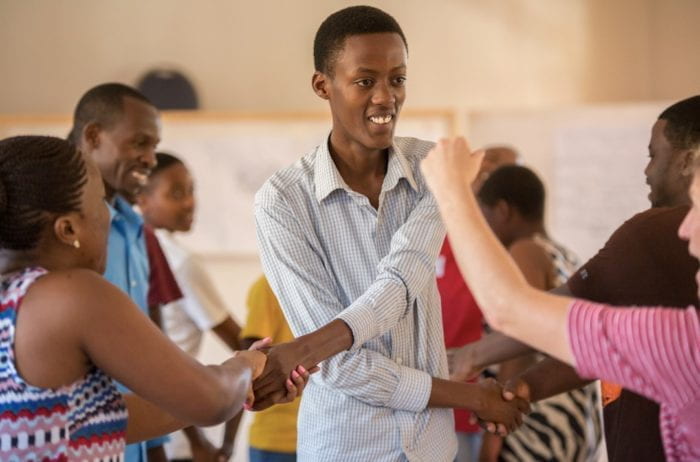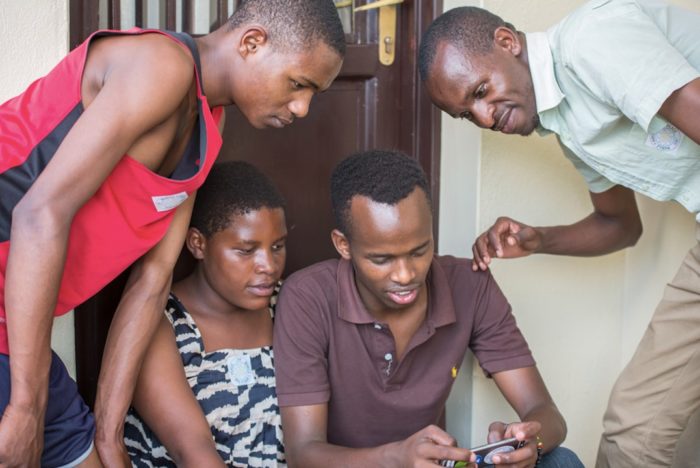Latest posts
- Policy documents: UNICEF Innocenti Discussion Paper on Children and Youth Participation (August 2025) 26 August 2025
- MAP International Online Conference 2025: Session Summaries Report 24 July 2025
- MAP 2025 Conference Highlights: Recordings and Slides 23 July 2025
- Journal article: Reimagining Peace Education in Nepal: Arts-Based, Learner-Centric Pedagogy for Social Justice and Equity 13 July 2025
- Curricula: Mithila art-focused local curriculum in Nepal 2 July 2025
- MAP International Online Conference 2025 1 June 2025
- Policy brief: Gira Ingoma book and policy brief: “The Culture We Want, for the Woman We Want” 28 November 2024
- Manuals and toolkits: GENPEACE Children’s Participation Module in the Development Process 13 November 2024
- Journal article: [Working Paper] Gira Ingoma – One Drum per Girl: The culture we want for the woman we want 30 October 2024
- Curricula: Beyond Tradition: Psychosocial Model 30 October 2024
- Curricula: Beyond Tradition Module: Revitalizing Lenong as a Model for Teaching Betawi Arts 30 October 2024
- Curricula: Beyond Tradition: Lenong Revitalisation as a Model for Teaching Betawi Cultural Arts 30 October 2024
Mobile Arts for Peace: Project Update May 2019
23rd March 2020
This post is a rework of the May 2019 MAP newsletter.
Take a look at what the MAP team have been up to so far in 2019.
Drawing Inspiration from Young People
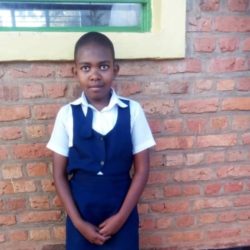
The artist, Ganza Daniella. Photo Hassan Ngendahimana.
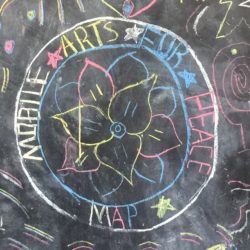
The original image that Ganza drew on a chalkboard.
January, 2019. Photo: Kurtis Dennison.
It was on a field visit to Friends of the Children International School after the January Stakehold meeting where the identity of MAP would forever be immortalized in our new logo designed by Ganza Daniella and rendered by Sinclair Ashman of the University of Lincoln. The students, excited to be getting a visit from the MAP team, welcomed the visitors with songs and drawings. While there were many wonderful drawings on paper and on the chalkboard, one image stood out: a flower.
A flower wasn’t the first image the project team would immediately associate with peace, but for this project, it made so much sense. A flower has to grow, and when it grows, it opens up to show its beauty much like MAP helps young people open up and express themselves. This project works with many partners (or petals) who are all necessary to the success of the project; the more petals, the more bountiful the flower. And through adaptation of cultural forms and creation of activities from Rwandan artists and teachers, the project is deeply rooted and cultivated by the people the project serves.
Ganza Daniella was thanked officially by the MAP facilitators at an award ceremony on April 27th. Her design will now be used to brand the project as we expand through the provinces of Rwanda.
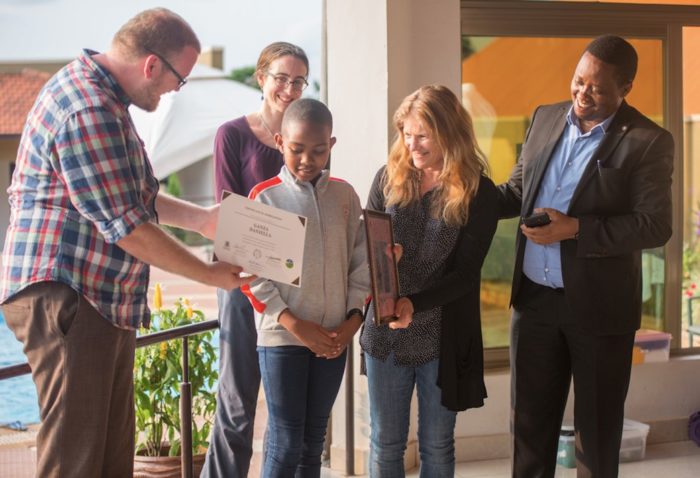
Project Manager Kurtis Dennison (IRDP), Principal Investigator of Connecting Memories Dr. Kirrily Pells (University College London), Ubwuzu Principal Investigator & Changing the Story Co-Investigator Dr. Ananda Breed (University of Lincoln) and Changing the Story Co-Investigator Dr. Eric Ndushabandi (IRDP) give Ganza a certificate and framed image of her design. April, 2019. Photo: Deus Kwizera.
Filmmaking for Peace? Eric Kabera’s Mobile Filmmaking Workshop
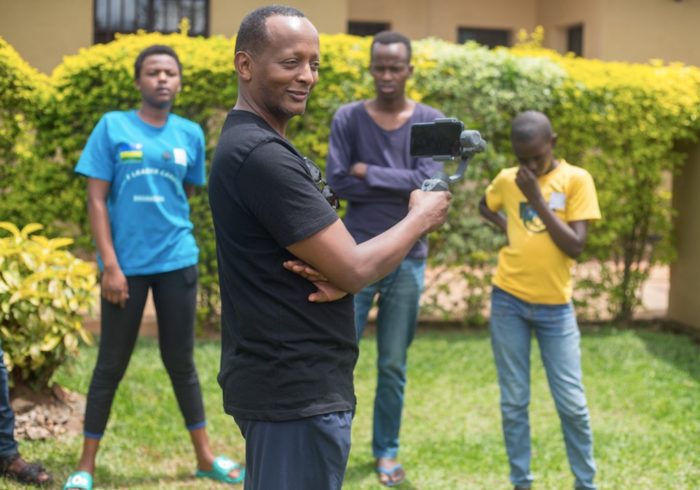
Eric Kabera holds his iPhone in a gimbal to demonstrate framing and movement in video making. April, 2019. Photo: Deus Kwizera.
Kwetu Film Institute and the Rwanda Cinema Center have been project partners of Mobile Arts for Peace since its inception. Since the beginning, an interactive workshop with world renowned film creator Eric Kabera has been planned. This April, this dream was finally realized.
Eric Kabera spent three days with the 16 MAP facilitators. Through exercises, the participants learned the basics of filmmaking including lighting, framing, storytelling, dialogue, mise en scène, and themes. The most impactful part of the workshop was the opportunity to hear the stories from Eric Kabera himself. Sharing a story of how he found inspiration once in a shoe, the most important lesson the facilitators learned was the need to be curious.
“I have learned that to make a film or a movie, you can have a plan and you can give the community strong story which can be interesting for them.” (-Sandrine, Rwamagana A)
Leonard, Dorcas, Reuben and Claude review footage at the Mobile Filmmaking Workshop. April, 2019. Photo: Deus Kwizera.
We think filmmaking can be an accessible tool for young people to share the stories that affect them to larger and mobile audiences. With the growing status of technology and a phone being a device most people have access to, these tools can help us to to see the world through the eyes of young people. Because Rwanda is striving to emphasis their technological potential, we think this is a perfect location to start this work. By thinking about situations they encounter and themes they wish to explore, the young people will continue to develop their skills in filmmaking, peace building and dialogue.
This opportunity was just the start for the MAP participants. By the end of the workshop, each participant had created a fully realized short film using all the elements learned. Each school will receive an iPhone 6 to keep on site allowing them to document their MAP activities and make short films. The participants were also invited to apply to the Rwanda Cinema Center Film Festival in August.
“Before attending the filmmaking session, I spent many years asking myself how different people can take different [pictures], how some people take good [pictures] and some take bad [pictures]. I was curious to know the strategies. From the workshop, I was happy because my worries were answered. What I can say is that making a film or taking a video is not something you do once and stop. You must rehearse many times so it will stick in your mind and you will be familiar with it.” (Ngabbonziza, RLS)
See the film ‘Headphones’ created by Florence, Leonard, Sam and Assia:
Connecting Memories: a Participatory Action Research Project
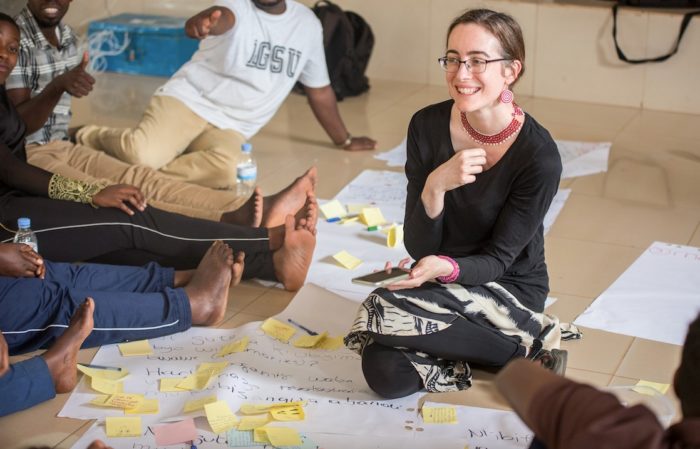
Dr. Kirrily Pells demonstrates data collection as young people and adult facilitators plan how they will conduct their research project. April, 2019. Photo: Deus Kwizera.
Connective Memories (CM) is a Participatory Action Research (PAR) project working alongside MAP. It is a collaboration between University College London (UCL) Institute of Education, IRDP, Uyisenga N’Imanzi and MAP. CM is adapting and extending the MAP methodology to a PAR project for two purposes. First, to engage youth and adult MAP facilitators in a co-designed PAR project on the broad theme of “memories” with the intention of fostering space for intergenerational dialogue through the creative arts. Second, to train youth and adult facilitators in PAR so that they have the skills to research and evaluate the impact of the MAP clubs in their schools.
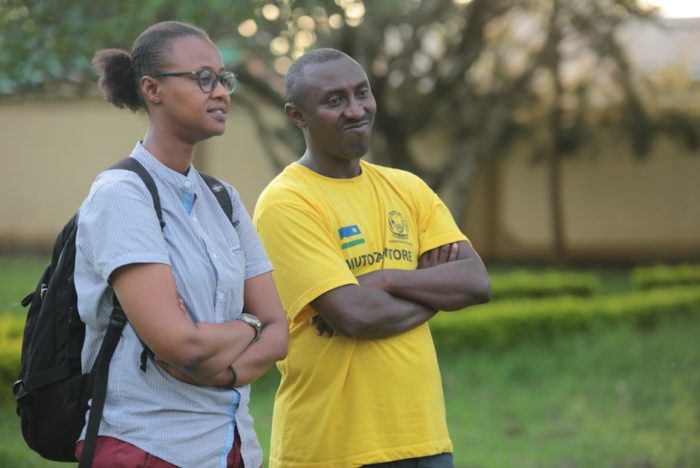
Ms. Laure Iyaga (Sana Initiative) and Mr. Chaste Uwihoreye (Uyisenga Ni Imanzi) observe youth participation to help with group dynamics and mental health support. April, 2019. Photo: Deus Kwizera.
The first workshops was held training 10 youth and 6 adults in PAR and co-desiging a research project on sharing “memories” or “isangizanyankuru”. We were then joined by another 20 young people from Uyisenga N’Imanzi and the groups of young people worked together to create performances based on issues affecting youth in their communities. On the final day the performances were shared with community members and dialogues facilitated by IRDP with adults and youth. This project also started the integration of community dialogues, a project long held by IRDP, in to the MAP methodology. The project will continue over the next few months as we work with the young researchers to analyse the data and we look forward to sharing the findings with you soon!
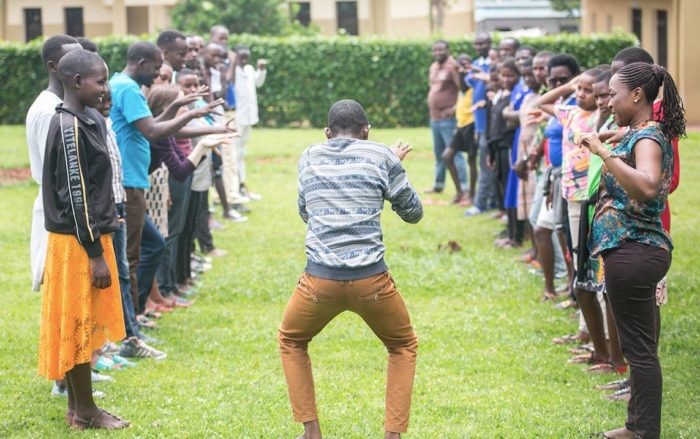
MAP Facilitator Leonard leads youth from Uyisena Ni Imanzi through the activity Kabish Kaboo. April, 2019. Photo: Kurtis Dennison.
Understanding the Project Structure: Co-Investigators and researchers attend the Network Plus meeting in Cambodia.
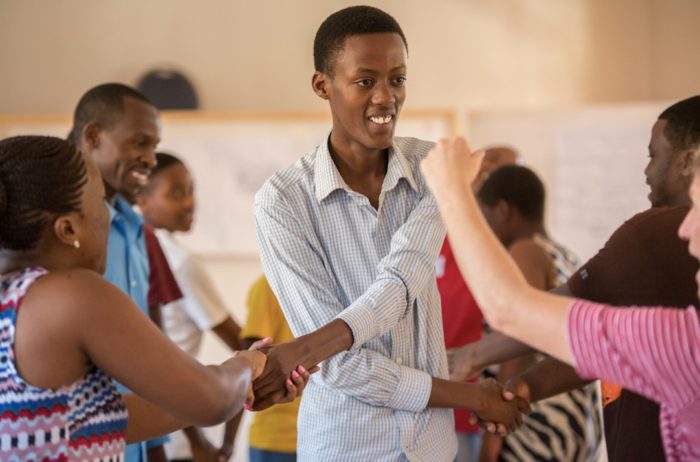
MAP Participants play Dr. Tangles, which is a good visual representation of a way a network plus project works. April, 2019. Photo: Deus Kwizera.
MAP was started as part of a Network Plus project called Changing the Story. This project was funded by a Global Challenges Research Fund grant from the Arts and Humanities Research Council lead by Dr. Paul Cooke from the University of Leeds. A Network Plus project works by first funding an initial pilot project, in our case Mobile Arts for Peace, working with researchers in both the UK and in Rwanda. Dr. Ananda Breed serves as the UK based Co-Investigator of the Rwanda Strand of this project. Hope Azeda served as the Rwanda based Phase One Co-Investigator while Dr. Eric Ndushabandi serves as the current Phase Two Co-Investigator. The goal of the pilot was to link together other researchers, artists and CSO’s working toward similar goals with an overarching theme of creating safe and inclusive participatory spaces for young people. We did this through working with Kwetu, Mashirika, Niyo, Future Vision Acrobats, Sana Initiative, REB, MindLeaps, Hope and Homes for Children, and other organisations that supported phase one activities including the training of teachers and creation of drama clubs.
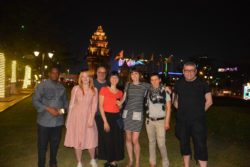
Dr. Eric Ndushabandi (left) joins other researchers and CTS project team including Dr. Paul Cooke (right) in Cambodia. March, 2019. Photo: Unknown.
The Network Plus project then supported new project ideas that were building off original phase one projects and findings, in our case Connecting Memories. Dr. Kirrily Pells, the UK based researcher, and Dr. Chaste Uwihoreye, the Rwanda based researcher, developed the project together from the work MAP accomplished in phase one. Their project was taking our initial findings and furthering the research, which connected MAP with new CSO’s and supported the work we hope to continue accomplishing. The major benefit so far of phase two has been to further expand on the role of psycho-social support and to help to integrate the work project partners are doing in to the original MAP structure.
MAP has been incredibly lucky to be partners with the Institute of Research for Dialogue and Peace for phase two. Eric Ndushabandi has approached MAP with such enthusiasm, and the project is helping to support initiatives within the organization steering future peace building projects to include psycho-social support. Representing Rwanda, Eric, Dr. Chaste Uwihoreye and Dr. Sylvestre Nzahabwanayo joined the Changing the Story team in Cambodia to learn more about CTS and share about MAP and their research.
During this time and separate from the original Changing the Story project structure, MAP was awarded three grants (two from the University of Lincoln and one from the Arts and Humanities Research Council) totaling £102,000 to continue the phase one goals and expand throughout the country of Rwanda. Dr. Ananda Breed serves as Principal Investigator of this follow up project which is titled “Ubwuzu: Shaping the Rwandan National Curriculum through the Arts”.

Dr. Eric Ndushabandi presents about Mobile Arts for Peace in Cambodia.
March, 2019. Photo: Unknown.
Changing the Story is going in to phase three to fund larger scale research projects that build off the work and continue the mission of these original two phases. The meeting in Cambodia was a time for all of these researchers to gather and share, meeting people who can help them achieve goals in their own countries and research. With each phase, new project partners are added creating a global network of people and organisations working toward common goals. Preparations are underway for a similar meeting to be held in Kigali, January 2020. More project information is available at https://changingthestory.leeds.ac.uk.
Mobile Arts for Peace is continuing to apply for grants and seeks project partners to continue the work of acomplished thus far. As we noted in our previous newsletter, MAP will be expanding to the other four provinces with a target to impact 300 adult trainers and 2,500 young people.
Transforming Trauma: Reimaging the Future through Arts in Rwanda and South Africa

Attendees of the colloquium gather in Kigali to share research and projects.
April, 2019. Photo: Emmanuel Tuyizere.

Dr. Eric Ndushabandi represents IRDP and Dr. Pumla Godobo-Madikizela represented Stellenbosch University at the signing of the partnership MOU. Photo: Emmanuel Tuyizere. April, 2019
A colloquium between the Institute of Research and Dialogue for Peace and the University of Stellenbosch was recently held at the IRDP Peace Center in the days leading up to Kwibuka 25. This colloquium reflected on the use of arts as a tool to heal trauma. Each country represented had its own history of trauma that could be explored. Speakers from South Africa reflected on remaining race divisions in artistic spaces while speakers from Rwanda shared initiatives such as MAP or Arts for Peace dialogues that have been used to create unity since the Genocide Against the Tutsi.
The colloquium included field visits to Bugesera to observe an IRDP community dialogue, to Rwamagana to observe a MAP club, a symposium in Kigali for researchers to share work, a publication from the University of Stellenbosch and an official partnership with IRDP for the continuation of work around these topics.
